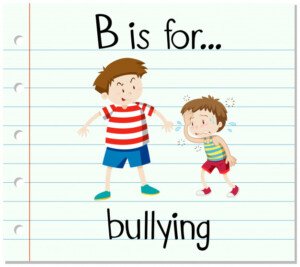Here are 12 things a parent of a bullied child or teen should always do and should never do.
Failure to follow these guidelines can lead to more suffering, not to mention possibly enable the bully.
Whether your child is in early grade school or in high school, these guidelines will apply.
Two experts on bullying among youth weigh in here.
Bullying can be physical (in hallways, locker rooms, bathrooms or on the schoolyard).
But it can also be non-physical (threats of physical harm, in-person and online harrassment, and other verbal tactics that leave a young mind feeling chronically unsafe or despondent).
Stay Calm
“It’s important for parents to stay calm if they learn their child is being bullied and also if they learn their child is suspected of bullying others,” says Deborah A. Temkin, PhD, Manager, Project SEATBELT, Bullying Prevention Initiative, Robert F. Kennedy Center for Justice and Human Rights.
Favor rationale and logic over emotion.
Dr. Temkin points out that a parent has a tendency to immediately jump to the child’s protection.
Though this may seem like the logical thing to do — and it may even produce a prompt, quick-fix solution — it will probably ultimately backfire.
It fails to empower the child and prevent or minimize future bullying.
Yes, you got rid of one bully (or a group), but what about the next crop of kids coming up on a different bus route, a new class, the transition from junior high to high school?
Pause and Think
“The first, and probably hardest thing to do when a child is bullied is to stop and think,” says Rona Novick, PhD, who developed the BRAVE bully prevention program.
A clinical psychologist, Dr. Novick has worked with schools nationally on the issue of bullying, and is director of the Fanya Gottesfeld Heller Doctoral Program at Yeshiva University, NY.
Figuratively speaking, don’t rush to put out the fire. Don’t “head up the posse to find and punish the bully,” says Dr. Novick.
Take time to think and be strategic, even if the bully lives next door.
Listen
Dr. Temkin advises parents to listen to their son or daughter.
Be approachable. Don’t interrupt. Jot down notes as your child explains things to discourage interrupting.
Let them be fully heard so you can get the most accurate account.
Don’t Judge
Don’t be judgmental or make them think you blame them for the bullying.
Avoid saying things that can make your child regret coming to you about the problem.
Do Not Invalidate
Do not dismiss their reports of bullying.
Imagine that someone at your workplace is harassing you, and you report this to human resources, and the HR department doesn’t take your complaint seriously or calls you “too sensitive.” Imagine that.
Okay, maybe your child is upset that a classmate simply poked fun at the color of his backpack.
This is an opportunity to teach him to hold his head high in spite of someone disagreeing with his color choice.
But never belittle your child for feeling slighted.
Do Not Shame

Shutterstock/fizkes
Never make your child feel ashamed of being bullied. Do not yell, scold or criticize.
Develop a Plan
“Develop a plan with children so that they can feel like they have some efficacy and control over the actions that will be taken,” says Dr. Tempkin.
The Power of the Pen
“Have them write out their experience in their own words, and ask what they think a solution might be,” adds Dr. Tempkin.
Don’t Underestimate What the School Can Do
Parents may figure there’s no point in alerting school authorities. Or, if they already have, may feel that the school isn’t taking the issue seriously.
It may seem that way in some cases, but this doesn’t mean it’s true.
Confidentiality laws prevent schools from revealing information about students to parents, while meanwhile, intervention strategies are in process.
Don’t Try to Get the Bully to Apologize

Freepik.com,gpointstudio
Dr. Novick absolutely does not endorse this. “It is too chancy, can easily turn into a humiliation that results in revenge.
“Apology letters are an alternative, but again, beware of inciting the bully to want to get revenge for being humiliated.”
Be Leery of Confronting the Bully’s Parents

Freepik.com
Should you decide to appeal directly to the bully’s parents, Dr. Temkin suggests getting a mediator.
“When parents confront other parents, the situation will rarely be peacefully resolved,” says Dr. Temkin.
Dr. Novick adds that parents should be acutely aware of the temptation to confront parents of bullies.
“Beware! These parents may not share your views and may endorse their child’s behavior.
“If you choose this option, tread lightly and do not expect great results — but some parents will want to work with you to solve a problem.”
Don’t “Rescue”
“Rescuing a bullied child, by inserting yourself in their social life, can actually further mark the child as socially less-than his or her peers,” says Dr. Novak.
“Confronting, threatening, or trying to reason with bullies can be equally ineffective, and can actually put the victim at risk for retaliation.”
Bonus Guideline
Do not ignore the situation and pretend it doesn’t exist. One reason against this approach is that it just might turn the bully victim into an actual bully.
A child without the guidance of a responsible parent’s perspective may end up taking matters into his or her own hands and decide to become more assertive.
This plan can backfire because the child, lacking perspective and social skills, may end up over-correcting their meek demeanor — going overboard with the newfound assertiveness, evolving into a full-fledged bully.



 Dr. Novick
Dr. Novick









